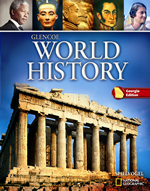

Glencoe World History © 2012 Georgia EditionChapter 4: Ancient Greece, 1900-133 B.C.Ancient Greece |  |
 | ||||||||||||||||||||||||||||||||||||||||||

| ||||||||||||||||||||||||||||||||||||||||||



Textbook Resources
Unit Resources
Chapter Activities
Section Resources



Teacher
Student
Textbook Resources
Unit Resources
Chapter Activities
Teacher
Student
Section Resources

  | |||||||||||||||||||||||||||||||||||||||||||||||||
Please read our Terms of Use and Privacy Notice before you explore our Web site. To report a technical problem with this Web site, please contact the Web Producer. | |||||||||||||||||||||||||||||||||||||||||||||||||


